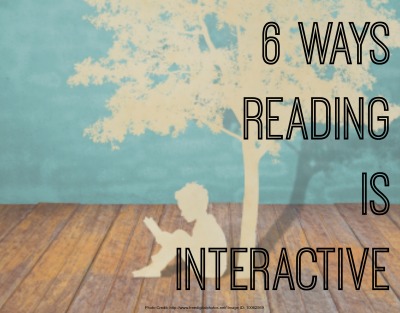Readers often feel like blank slates waiting for the story to communicate its plot, themes, and purpose to them. They see reading as interpreting words on paper, and the story as a one-way communication of author to reader. Authorial intent is very important, but young readers need to be encouraged to interpret the narrative in a personal way.
Reading can be deeply interactive.
We may try to keep our mental and emotional distance from a story, but we can’t ignore how our personality, background, values, interests, and knowledge bring personal meaning to each book.
As readers, we are participating in the story whether we realize it or not:
- We have a reason for choosing that particular story to read, and in so doing bring our expectations to it. Did we chose the story because of the setting, time period, characters, or genre? Do we want to learn something new, or enjoy visiting something familiar? Your attitude will affect your reception of the story’s plot and understanding of its themes.
- We interpret the character’s actions and course of events based on our own background and perspectives. A character may own a dog, be allergic to bees, face racial tensions, and work for the government – and we will react to each of these based on our knowledge and feelings about dogs, racism, bees, allergies, and the government.
- We tend to invest attention in what interests us. Consider a story set in Ireland where the protagonist is a descendant of a long line of wizards. Some readers will be fascinated by all descriptions of the setting – the countryside, culture, weather, and language; others will latch on to the mythology of the wizard’s family and source of power.
- Relationships always have angles, and in a story with a relationship between an Asian man and white American woman, or successful employer and struggling employee, or a student and teacher, we will gravitate toward the character that most closely resembles our gender, age, socio-economic class, ethnicity, or station in life. We will then interpret events in light of that character connection.
- Our emotional responses to characters and storylines are uniquely ours. Story elements that are emotional or frightening for you might not affect others in the same way.
- Themes are also intensely personal. Theme is where a story transcends our gender, age, socio-economic class, ethnicity, or station in life, and invites us to consider ideas like freedom, personhood, greed, sacrifice, deceit, friendship, integrity. . . All humans have experience with these concepts to some degree, and the underlying truths of a story go beyond appearances and reach into our hearts and minds
Books and reading can exercise a young person’s sense of empathy and allow them to explore complex topics in a safe environment.
Uncle Tom’s Cabin helps us gain an understanding of the cruelty of slavery and why it was so intolerable, even for those slaves who had ‘kind’ masters. In The Giver, we are encouraged to consider the importance of individuality. In addition to issues of censorship, Fahrenheit 451 examines the tension between knowledge and ignorance, and warns of the dangers of trying to create ‘equality’ by controlling the flow of information.
How can you help your young reader become more interactive in their reading?
In a relaxed, conversational atmosphere, ask these questions about your child’s reading choices:
Prereading:
Why did you choose this particular story?
What does the title and cover convey to you?
What do you think you might learn from this story?
What about this story is familiar (author, genre, setting)?
After reading:
Which character(s) did you relate to the most? Why?
Was there a character you didn’t like? Why?
Did any characters remind you of people you know personally?
Have you ever experienced a similar setting or situation?
Do you think you would react the same way as the characters to the main conflict?
How did you feel when the story ended?
It is important to encourage your readers to view books as interactive instead of passive.
Help them see how their point of view brings personal meaning to the story, and how they can explore their own minds and hearts through the lens of
fiction.
How have stories affected you personally? Share your experiences with your young readers and make reading part of how you and your child understand and interact with each other.
 Susan Raber writes about homeschooling, issues in education, books, and reading at Susan Online.
Susan Raber writes about homeschooling, issues in education, books, and reading at Susan Online.

